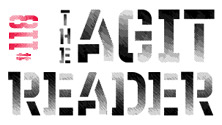by Stephen Slaybaugh
While on paper there’s not much to tie the latest releases from London grime vets Black Time and Tours, France’s one-man tonal mutilation newcomer the Dictaphone—other than both artists are overseas and that their respective records landed at the Agit offices within a few weeks of each other—there is at least a tenuous thread of sonic reduction running between them. Closer inspections of these slabs’ grooves show the same kind of approach, one that has little use for affectation or anything other than a hardnosed dive into the abyss.

Black Time, More Songs About Motorcycles & Death EP (Wrench)
Black Time should be at least vaguely familiar to PF readers, having released a trio of albums on In the Red since the middle of the decade. Those longplayers delved deep into the band’s bastion of gloom-laden noise. The sludge these limeys dredged was omnipresent, coating their barbed hooks with an inky film. The heavy vibe piercing their din of rock & roll essentials made for bad music for bad people, like the soundtrack to some juvie quaalude binge. However, on their new EP, More Songs About Motorcycles & Death, frontman Lemmy Caution has loosened up the reins, actually letting some light in between the riffs for once. Still, leadoff “Fast Motorbike in the Kitchen” is a curt kick to the gut, the full brunt of its hammering riffs boring in at optimum volume. Indeed, while in the past Black Time has opted for lengthy unravellings of their darkened ruckus, here they cut to the chase in indulging their fetish for motorcycles (and death). Cuts like “Cycles” and “Harley Davidson” are modern revved-up odes, but “Mallory Park” is all dirge and fuzz. And though “The Living Dead” is appropriately bone-rattling, its slinky guitar work is still born from the blues. This album amply shows the band’s rare feat of having one foot in the present and the other in the grave.

The Dictaphone, The Dictaphone (Kill Shaman)
The Dictaphone, while not as oppressive as Black Time, works within a similar realm, diffusing minimal song structures through a siphon of fuzzy remnants. The aesthetic seems completely contradictory to the picturesque Loire locale, but who knows what goes on amongst the vineyards? Songs like “Hassle Cult” and “Weak Pattern” show our unnamed homme has cut his teeth on just as much Fall as Cabaret Voltaire, though both come up in varied degrees over the course of the album. It’s actually the former that wins out on “Drug Punk,” a sparse din of guitar strangulations, intermittent bursts of frequency and morse code drumbeats. When the Dictaphone’s rockist tendencies win out, as on “Dead Beats,” the effect is no less jittery, a rush of riffs and rhythmic cracks racing to be the first out of the gates. The Dictaphone is lighter than Black Time, but no less all-consuming, a world unto itself scraped together from the smashed pieces of his deconstructed heritage.
PRIMITIVE FUTURES
Kito-Mizukumi Rouber, Midori Mushi San Connichiwa
Mark McGuire, Living with Yourself
Rotate the Completor, Rotate the Completors: Completed Rotations of the...
Hozac Hookup Klub Year Two
Introducing... Prince Rama
Stark Folk Band, Well-Oiled
El Jesus de Magico, Ragtime Hors
Sacred Bones' Summer Swoon
Frank (Just Frank), The Brutal Wave
An Interview with Fabulous Diamonds
Welcome Home/Diggin' the Universe: A Woodsist Compilation
Top 10 Artifacts for the First Half of 2010
Knowing the Unknown
Naked on the Vague, Heaps of Nothing
